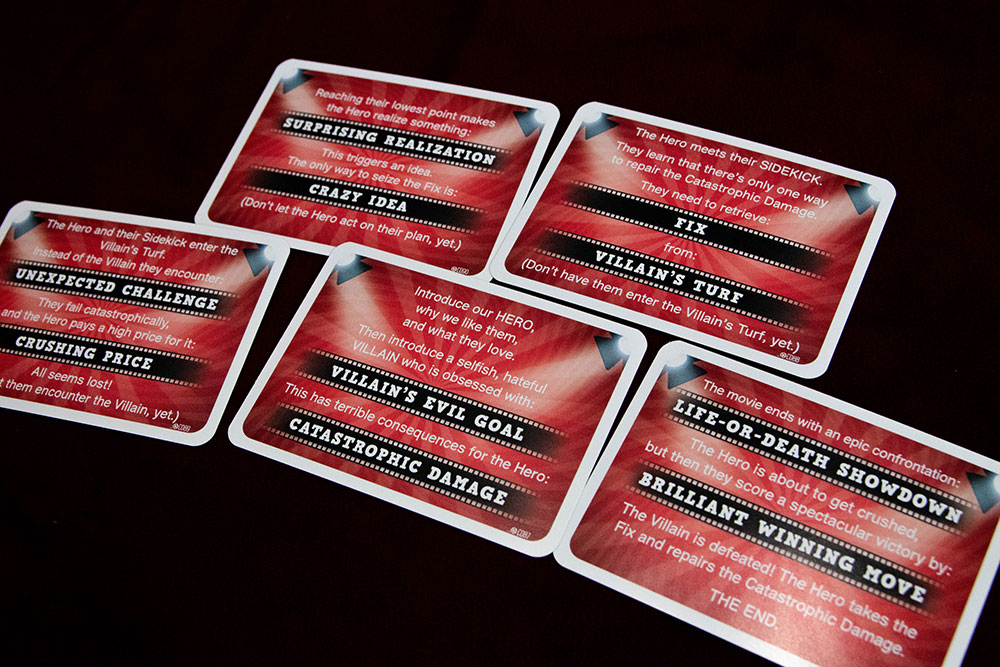 Movie-making is big business. And today you and your scriptwriting team are going to be making a pitch to the studio execs trying to greenlight the next sci-fi masterpiece or fantasy epic. But you aren’t the only screenwriters in town and will be competing against others trying to impress those in charge.
Movie-making is big business. And today you and your scriptwriting team are going to be making a pitch to the studio execs trying to greenlight the next sci-fi masterpiece or fantasy epic. But you aren’t the only screenwriters in town and will be competing against others trying to impress those in charge.
Will you be leading the next phase of the Marvel Cinematic Universe or be destined to write jingles for local radio ads? Only time will tell. Today we are going to review Million Dollar Script, a party game published by Portal Games.
Gameplay Overview:
Million Dollar Script is played over five rounds where teams will develop the plot of their movie throughout the process. The first round always starts by developing a hero and a villain by drawing character cards that give them characteristics and experiences to provide a jumping off point for the storytelling. Perhaps your hero will be “A heartbroken nun who is taking medication with unexpected side effects.” And they will encounter “A superstitious ex-roommate who is determined to overthrow the government.”

With this information, teams will have to outline the villain’s goal and the kind of bad things they do to the hero to get the movie started. Each team will then make their pitch to the executive and teams can have players draw roles to provide the main narrative, dialogue, and sound effects. Executives will choose a winning team who will earn the majority of the points but can also give out points for items from the pitch they liked from other teams.
The game then continues under a similar format with the pitches eventually introducing a sidekick, an unexpected hiccup in the plans, and of course, a dramatic final confrontation. Whichever team earns the most points throughout the five rounds gets their project approved and is off to Hollywood!

Game Experience:
Million Dollar Script, like many storytelling party games, is a game about being creative and a bit silly with your friends. The experience you have is largely dependent on your group and how they approach making up stories and trying their best to be witty. Of course, the structure of the game can sometimes make this more or less easy to accomplish so let’s talk first about what Million Dollar Script does extremely well.
The first two rounds involve character creation where you draw three cards and instantly get a zany character you have to weave into the narrative. It’s a genius way to provide players with something unique and a bit of direction rather than just giving a completely open-ended prompt of “give me a hero!” They have just enough detail that you can start thinking of some plot points but go in wildly different directions. Like, what exactly happened between our Nun-hero and their roommate that led her to self-medicate and the villain to blame the government?

I do wish there was some variety in the prompts from game to game. Each game, the five rounds are exactly the same. Hero and villain, sidekick, unexpected event… etc. I get it, movies are pretty formulaic these days. The three-act structure exists for a reason. It’s probably not very exciting to pitch an independent film where nothing really happens for two hours other than people sitting around and talking (I’m looking at you, Richard Linklater). But there could certainly be some different paths here—maybe in the third pitch the sidekick turns evil randomly. Or instead of a final battle where the hero always wins there is a chance for a cliffhanger ending or surprise upset. As it stands, after a game or two of Million Dollar Script you’ll know the formula and be able to basically come up with all the pitches after the characters get developed.
My other gripe with Million Dollar Script—which is admittedly a gripe with most of these types of games—is that one person basically just plays the role of the executive and doesn’t get to do much. There are executive cards that give them a list of things that really resonate with them that they can use to score extra points. The rulebook encourages them to be able to ask follow-ups and take an active role. But in practice, they mostly sit around, listen, and dole out victory points. It’s still fun, at least if the teams are making up good stories, but it’s not really a role most people would prefer to take.
Final Thoughts:
You likely know if you like storytelling games or not. There’s a bunch out there from Snake Oil to Funemployed. I’m a movie aficionado so if I’m going to play one, Million Dollar Script is a solid option and the character creation decks provide a great way to get the stories off the ground at the beginning.
I would love more variety in the structure of the pitches throughout Million Dollar Script. And like all these games where someone is the judge, that person just doesn’t really have enough to do.
Final Score: 3 Stars – Fun character creation and a good way to tell a story. Just lacking a bit of variety.

Hits:
• Character creation deck is a brilliant way to get teams started with their movie.
• Appreciate the varieties of genres that can be used to change things up.
Misses:
• The five pitch rounds are the same every game.
• Executive doesn’t really get in on the action.
Source: Board Game Quest






